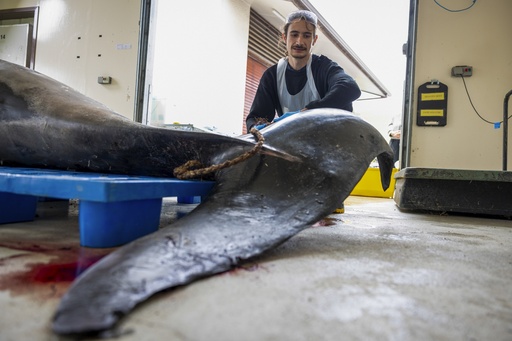WELLINGTON, New Zealand — The spade-toothed whale holds the title of being the rarest whale species in the world, with only seven recorded sightings to date. Despite mankind’s limited knowledge about this species, a dedicated group of researchers and cultural experts in New Zealand gathered on Monday around a remarkably well-preserved specimen, igniting hopes of unraveling the mysteries surrounding these elusive creatures.
“I can’t express how extraordinary this is,” exclaimed Anton van Helden, a senior marine science adviser with New Zealand’s conservation authority, who played a pivotal role in naming the spade-toothed whale to distinguish it from other beaked whales. “Personally, it feels almost unreal.”
Having spent 35 years studying beaked whales, Van Helden had never before participated in the dissection of a spade-toothed whale. The creature, which had washed ashore in July, was being examined as part of a groundbreaking scientific analysis.
Despite extensive efforts, no one has ever observed a spade-toothed whale alive in its natural habitat. Consequently, the extent of knowledge surrounding these astounding whales is minimal, with scientists still questioning where they reside in the ocean and the reasons behind their extreme rarity. They remain ignorant about their brain structure, dietary habits, and even the cause of this particular whale’s death.
Over the ensuing week, researchers at an agricultural center close to Dunedin will seek answers regarding the male whale, which measures about five meters (16 feet) in length. Van Helden suggested there might even be unidentified parasites that inhabit this unique whale, which could yield groundbreaking discoveries concerning its feeding mechanisms and vocalization. “Who knows what we might uncover?” he stated.
Despite the previous finds of six other spade-toothed whales, each of them had either been buried before DNA testing could confirm their species or had disintegrated beyond recognition. Notably, New Zealand experiences a high frequency of whale strandings, with over 5,000 incidents documented since 1840, as reported by conservation authorities. The first-ever bones of a spade-toothed whale were unearthed on Pitt Island in 1872. Further discoveries happened in the 1950s on an offshore island and again in 1986 on Robinson Crusoe Island, Chile.
The DNA testing conducted in 2002 established that these three specimens were all members of the same whale species, distinct from other beaked whales. However, it wasn’t until 2010, following the discovery of two additional dead specimens on a New Zealand beach, that researchers were able to confirm the species had not gone extinct. Until now, none of these whales had been examined comprehensively.
The whale in question, identified as the seventh of its type, appeared remarkably intact, showing minimal signs of distress. Observers noted bite marks left by cookiecutter sharks, which were considered normal and not indicative of its demise.
The dissection will be conducted with great care, taking a slower and more meticulous approach in partnership with the M?ori, New Zealand’s Indigenous people. Whales are regarded as a taonga, or precious treasure, by M?ori, and this particular specimen will be treated with the utmost reverence and respect, akin to that granted to an ancestor. Local iwi members will be present throughout the dissection process to offer cultural insights, as well as participate in traditional ceremonies, such as chanting a karakia — a prayer to honor the whale before the research commences.



